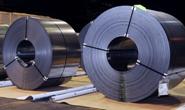Government/Policy

September 11, 2015
ITC Determines Probable Injury in Cold Rolled Steel Case
Written by Sandy Williams
As expected, the U.S. International Trade Commission (ITC) has made a preliminary determination that cold-rolled steel produced in seven foreign countries (Brazil, China, India, Japan, Russia, South Korea and UK) is causing or threatening to cause injury to the domestic steel industry. The Netherlands, which was also named in the antidumping suit, was dropped from the investigation by the ITC because the quantity of imports from the Netherlands was negligible (less than 3 percent of the total imports of cold-rolled steel in the period of investigation).
“We applaud the ITC’s preliminary ruling against dumped and subsidized imports of cold-rolled steel,” said James L. Wainscott, Chairman, President and CEO of AK Steel. “We expect all of our global steel competitors to play by the rules of fair trade, and this ruling is an important step in the fight to stop the injury to the domestic steel industry caused by unfairly-traded imports of cold-rolled steel.”
On July 28, 2015, five major U.S. steel producers – AK Steel Corporation, ArcelorMittal USA LLC, Nucor Corporation, Steel Dynamics, Inc., and United States Steel Corporation – filed petitions with the ITC and the Department of Commerce charging that unfairly traded imports of cold-rolled steel from Brazil, China, India, Japan, the Netherlands, Russia, South Korea and the United Kingdom were causing material injury to the domestic industry. Anti-dumping cases were filed against all eight countries and countervailing duty cases were filed against Brazil, China, India, Russia, and South Korea.
The Commerce Department will make preliminary CVD determinations in October 2015 and its preliminary AD determinations in January 2016, unless the statutory deadlines are extended.
If foreign producers attempt to increase shipments into the U.S. market before the Commerce Department’s preliminary determinations, anti-dumping and countervailing duties can be imposed retroactively beginning 90 days prior to the preliminary determinations.
Cold-rolled steel is hot-rolled steel that has been hardened through the cold-rolling process and that may or may not undergo further processing including annealing, hardening / tempering, and temper rolling. While a substantial portion of cold-rolled steel production is used “as is,” a majority in the United States is further processed by galvanizing or coating. Cold-rolled steel is primarily used in appliances, automotive products, containers, and construction.







